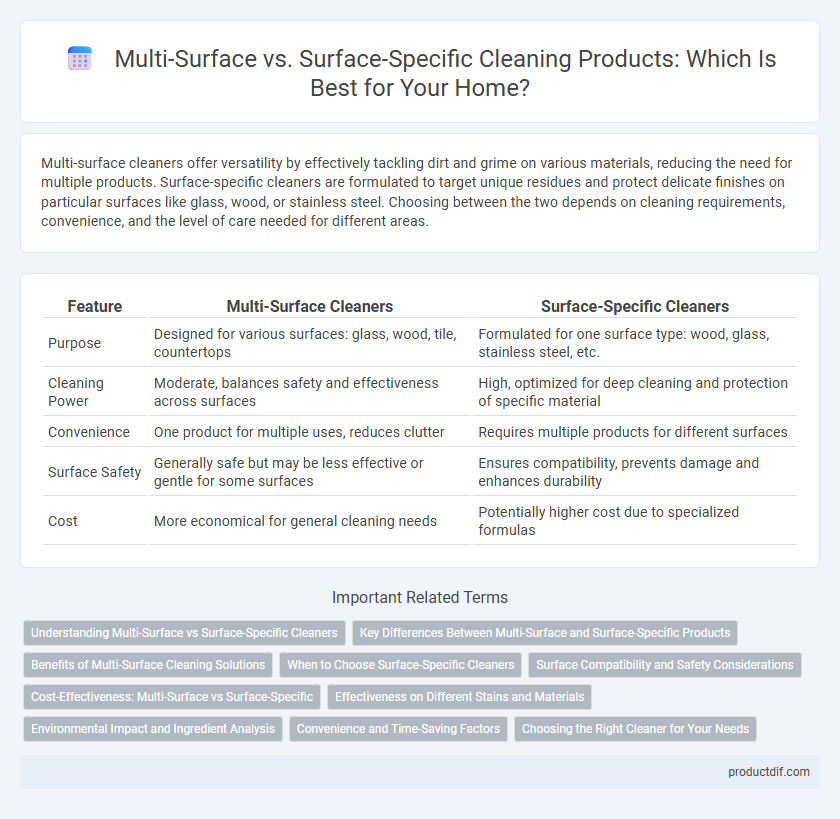Multi-surface cleaners offer versatility by effectively tackling dirt and grime on various materials, reducing the need for multiple products. Surface-specific cleaners are formulated to target unique residues and protect delicate finishes on particular surfaces like glass, wood, or stainless steel. Choosing between the two depends on cleaning requirements, convenience, and the level of care needed for different areas.
Table of Comparison
| Feature | Multi-Surface Cleaners | Surface-Specific Cleaners |
|---|---|---|
| Purpose | Designed for various surfaces: glass, wood, tile, countertops | Formulated for one surface type: wood, glass, stainless steel, etc. |
| Cleaning Power | Moderate, balances safety and effectiveness across surfaces | High, optimized for deep cleaning and protection of specific material |
| Convenience | One product for multiple uses, reduces clutter | Requires multiple products for different surfaces |
| Surface Safety | Generally safe but may be less effective or gentle for some surfaces | Ensures compatibility, prevents damage and enhances durability |
| Cost | More economical for general cleaning needs | Potentially higher cost due to specialized formulas |
Understanding Multi-Surface vs Surface-Specific Cleaners
Multi-surface cleaners offer the convenience of effective cleaning across various materials like glass, wood, and tile, reducing the need for multiple products. Surface-specific cleaners are formulated to address the unique properties of materials such as stainless steel or granite, ensuring targeted stain removal and surface protection. Choosing between multi-surface and surface-specific cleaners depends on the balance between versatility and specialized care required for different surfaces.
Key Differences Between Multi-Surface and Surface-Specific Products
Multi-surface cleaning products offer versatility by effectively cleaning various surfaces such as glass, wood, metal, and plastic, reducing the need for multiple cleaners and saving storage space. Surface-specific products are formulated with tailored ingredients to address the unique needs of particular materials like granite, hardwood, or stainless steel, enhancing cleaning efficiency and protecting surface integrity. Key differences include the formulation focus, with multi-surface products balancing broad-spectrum cleaning power and surface safety, while surface-specific cleaners optimize performance and protection based on material characteristics.
Benefits of Multi-Surface Cleaning Solutions
Multi-surface cleaning solutions offer versatility by effectively removing dirt and grime from wood, glass, tile, and stainless steel, reducing the need to purchase multiple products. These products often contain balanced formulations that are safe for various materials, minimizing surface damage and saving time during cleaning routines. Their convenience supports eco-friendly practices by lowering chemical waste and packaging consumption.
When to Choose Surface-Specific Cleaners
Surface-specific cleaners are ideal for delicate materials like wood, marble, or glass where specialized formulas prevent damage and preserve finish quality. These cleaners contain tailored ingredients designed to effectively remove dirt and stains without causing discoloration or erosion. Opt for surface-specific products when cleaning high-maintenance or sensitive surfaces to ensure safety and optimal results.
Surface Compatibility and Safety Considerations
Multi-surface cleaners offer broad compatibility across various materials such as glass, wood, and metal, reducing the need for multiple products while ensuring safety with balanced pH levels and non-toxic ingredients. Surface-specific cleaners target particular materials like granite or stainless steel, providing tailored formulations that enhance cleaning efficiency and protect finish integrity. Safety considerations include checking chemical compositions for corrosiveness or allergens to avoid damage or health risks on sensitive surfaces.
Cost-Effectiveness: Multi-Surface vs Surface-Specific
Multi-surface cleaners offer cost-effectiveness by reducing the need to purchase multiple specialized products, making them ideal for budget-conscious consumers. Surface-specific cleaners may deliver optimized cleaning results for particular materials but often increase overall expenses due to the necessity of buying several different products. Evaluating cleaning frequency and surface variety helps determine the most economical choice for households or businesses.
Effectiveness on Different Stains and Materials
Multi-surface cleaners offer versatility by effectively tackling common stains across various materials such as glass, wood, and tile, making them ideal for general cleaning tasks. Surface-specific products are formulated with specialized ingredients that target stubborn stains and preserve the integrity of delicate materials like marble, stainless steel, or hardwood. Choosing the right cleaning product based on the type of stain and surface ensures optimal stain removal and material protection.
Environmental Impact and Ingredient Analysis
Multi-surface cleaning products often contain a broader spectrum of chemicals to address various materials, which can lead to increased environmental persistence and potential waterway contamination. Surface-specific cleaners usually have targeted formulas with fewer synthetic additives, reducing the ecological footprint and minimizing toxicity to aquatic life. Analyzing ingredient lists reveals that biodegradable surfactants and plant-based solvents in surface-specific products contribute to lower environmental impact compared to the complex chemical blends found in many multi-surface alternatives.
Convenience and Time-Saving Factors
Multi-surface cleaning products offer the convenience of using a single solution for different areas, significantly reducing the number of items needed and streamlining the cleaning process. Surface-specific cleaners, while often more effective for particular materials, require switching products, which can increase cleaning time and complexity. Choosing multi-surface options maximizes time-saving by simplifying tasks without sacrificing cleanliness across various surfaces.
Choosing the Right Cleaner for Your Needs
Multi-surface cleaners offer versatility by effectively removing dirt, grease, and grime from various materials such as wood, glass, metal, and plastic, making them ideal for general household cleaning. Surface-specific cleaners are formulated to address the unique properties and cleaning requirements of particular surfaces like granite, hardwood, or stainless steel, ensuring optimal results without causing damage. Selecting the right cleaner depends on evaluating the surface type, the nature of the cleaning task, and desired outcomes to maintain both cleanliness and surface integrity.
Multi-surface vs Surface-specific Infographic

 productdif.com
productdif.com